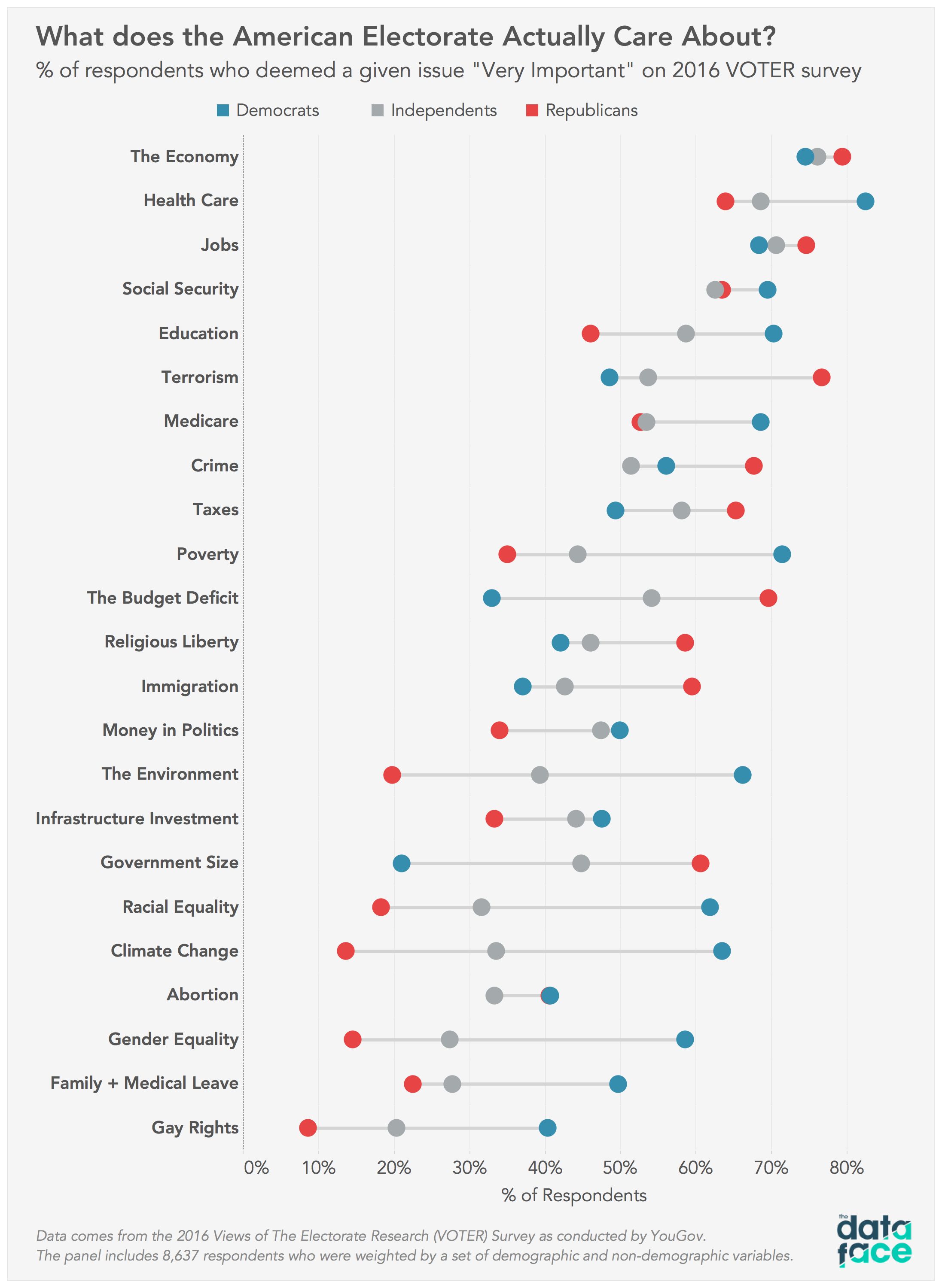Several weeks after the 2016 presidential election, the Democracy Fund Voter Study Group1commissioned a survey to gauge the opinions and attitudes of the American electorate heading into Donald Trump's first term. They partnered with YouGov to administer the 2016 VOTER Survey to over 8,000 adults, most of whom had participated in similar studies in 2011, 2012, and mid-2016. In this way, the group was able to construct a longitudinal dataset of the electorate's feelings on hundreds of topics and hotly-debated questions.
We've taken the results from 23 questions on the 2016 VOTER survey and plotted them below. This section of the survey dealt with how "important" respondents felt various issues were to them -- from crime, to the environment, to immigration. We've grouped the data according to the respondents' self-identified party affiliation.


Sign up to get our latest work sent directly to you.
The most important issue to voters across the political spectrum was the economy. Over 78% of respondents marked the economy as "very important" to them, irrespective of party. It was the #1 issue among Republicans and #2 among Democrats, second only to health care. Perhaps James Carville said it best -- it's the economy, stupid!
Climate change and the environment stand out as the most contentious issues on the VOTER survey. Sixty-three percent of Democrats claimed that climate change was "very important" to them, while only 13% of Republicans did so. Thoughts about the environment were split similarly along party lines, with a 46-point spread between Democrats and Republicans. With so few Republicans citing the environment as a top concern, it's perhaps no wonder that Scott Pruitt's mission to shrink the EPA has continued unabated.
The VOTER survey also asked about the importance of racial, gender, and gay equality. All three issues finished in the bottom six, with less than 50% of respondents citing them as "very important" matters. The perceived importance of gay rights was particularly striking; even among respondents who identified as Democrats, only 40% noted it as an issue they cared about very deeply. Despite the recent emergence of social movements aimed at promoting equality, it still seems to only be a pressing issue for a minority of voters.
Footnotes:
- The Democracy Fund Voter Study Group is composed of nearly two dozen analysts and scholars from across the political spectrum. The survey wasn't constructed with any partisan goals in mind. ↩︎
Methodology:
Our analysis is based on responses to 23 questions on the 2016 VOTER Survey. Here's a summary of YouGov's methodology from the Democracy Fund Voter Study Group's website:
The Views of the Electorate Research (VOTER) Survey was conducted by the survey firm YouGov. In total, 8,000 adults (age 18+) with internet access took the survey on-line between November 29 and December 29, 2016. The reported margin of error is plus or minus 2.2%. YouGov also supplied measures of primary voting behavior from the end of the primary period (July 2016), when these respondents had been contacted as part of a different survey project.
These respondents were originally interviewed by YouGov in 2011-2012 as part of the 2012 Cooperative Campaign Analysis Project (CCAP). In that survey, 45,000 respondents were first interviewed in December 2011 and were interviewed a second time in one of the 45 weekly surveys between January 1 and November 8, 2012. After the November election, 35,408 respondents were interviewed a third time. For this survey 11,168 panelists from 2012 CCAP were invited to respond and 8,637 of them (77%) completed the 2016 survey.
CCAP respondents were selected using YouGov's stratified sampling technique, which is intended to mirror the age, gender, race, and education of the general U.S. population. Each respondent is assigned a "weight" according to a set of demographic and non-demographic variables. For more on YouGov's methodology, see this PDF.
Nerd Notes:
Graphic was created in Tableau.
The 2016 dataset is available for download here. The Democracy Fund Voter Study Group also published the results of their 2017 survey back in September, which focused more on the Trump Administration, the direction of the country, and midterm elections. Here's a brief write-up of their findings.



